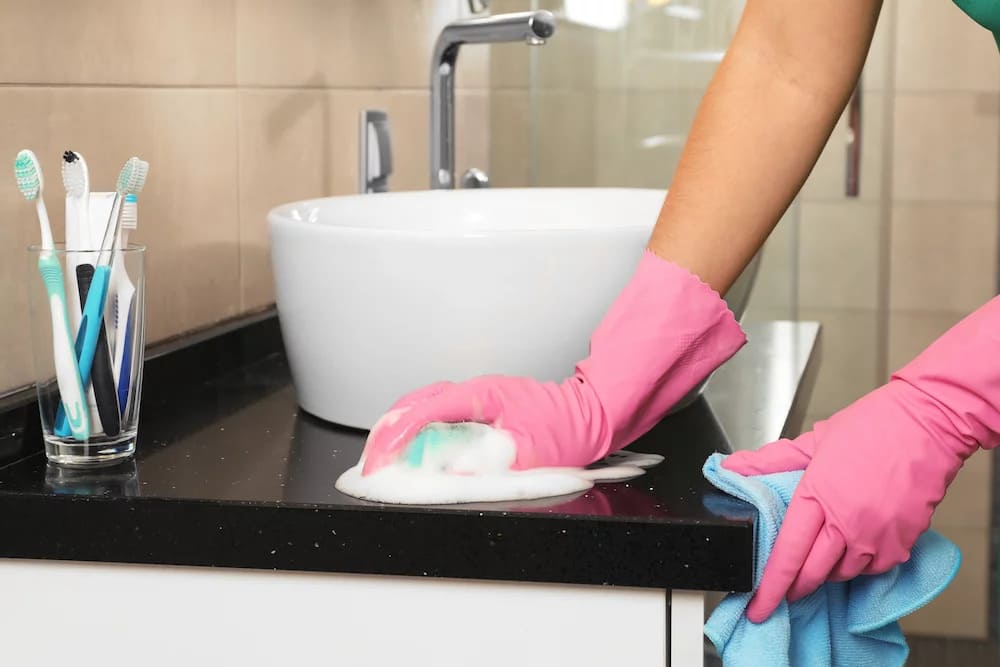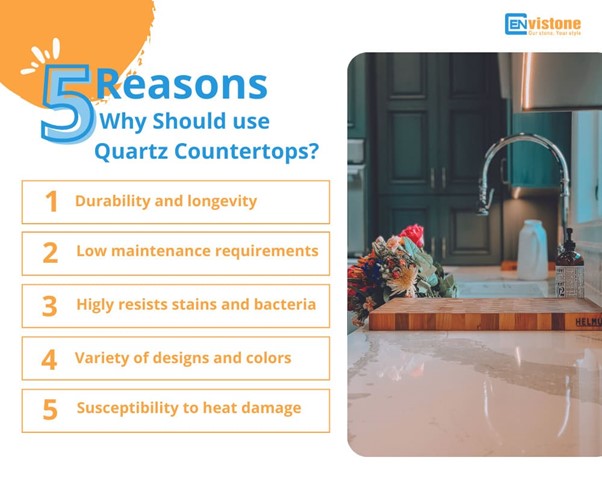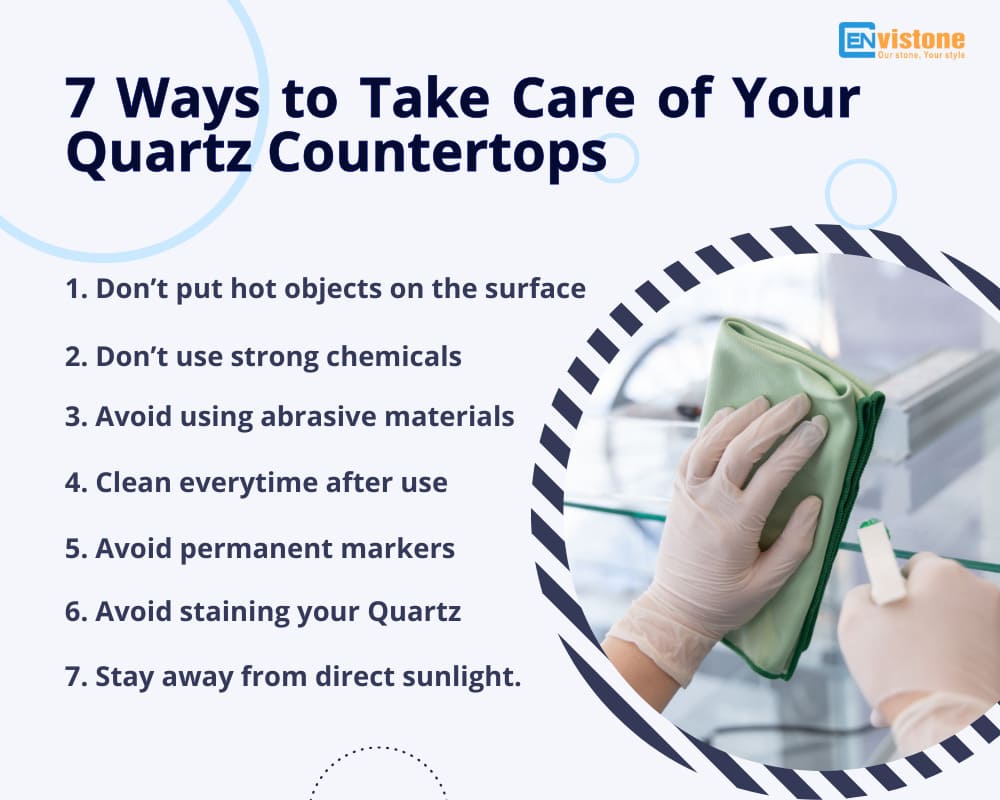How to Care for Quartz Countertops: Essential Do's and Don'ts for 2024

How to Care for Quartz Countertops
In a Nutshell
Caring for your quartz countertops is super important in order to maintain their durability and appearance. Proper care ensures longevity and preserves the beauty of your quartz surfaces in kitchens and bathrooms.
- Quartz countertops require gentle cleaning methods and appropriate products to avoid damage and ensure their timeless aesthetic is preserved.
- Regular maintenance includes basic cleaning with mild detergent and water, avoiding harsh chemicals that can cause discoloration.
- Immediate action on spills, particularly those that are acidic or pigmented, can prevent permanent stains and maintain the countertop's resistance to discoloration.
- Utilizing cutting boards, trivets, and being mindful of heavy objects can protect quartz from scratches and impacts, contributing to its durability and longevity.
Let’s explore step-by-step guide and 7 methods How to Care for Quartz Countertops
5 Reasons why Should use Quartz Countertops

5 Reasons why Should use Quartz Countertops
1. Durability and longevity of quartz
When considering different countertop materials, one of the benefits of quartz countertops is its exceptional durability. Unlike materials such as marble, which you can chip and scratch much easier, quartz is well-known for its resilience and can handle the demands of a busy household without showing too much wear and tear. This amazing material has proven to withstand the test of time, making it a practical investment for spaces that see daily use.
2. Low maintenance requirements

Durability and longevity of quartz
Quartz's low maintenance requirements make it a perfect solution for today's fast-paced lifestyles. Its strength lies in the minimal upkeep compared to materials such as granite, which require regular sealing to maintain their new condition. With quartz, you can forget about the need for yearly sealing, giving you more time to focus on life's other pleasures, all while your countertops remain as pristine as the day they were installed.
3. Non-porous surface resists stains and bacteria
Does quartz stain? Quartz's non-porous nature sets it apart from other countertop options like marble or limestone, which are more susceptible to stains due to their porous composition. This feature ensures that accidental spills of wine, coffee, or oil can be easily wiped away without leaving a permanent mark. Moreover, quartz's resistance to bacteria and mold growth is a significant health benefit, especially when compared to more permeable materials that might harbor harmful microorganisms within their nooks and crannies.
4. Wide variety of designs and colors
One of the joys of choosing quartz for your countertop is the sheer variety of designs and colors available. Unlike the predictable patterns of materials like porcelain, quartz countertops can mimic the look of natural stone while offering a much broader spectrum of aesthetic options. Whether you're envisioning warm quartz countertops or a particular shade to match your decor, you'll find an array to select from, ensuring your space is both unique and aligned with your personal style.
5. Susceptibility to heat damage
Despite quartz's commendable features, it's critical to remember that it is less heat resistant than natural stones like granite. To maintain the pristine condition of quartz countertops, it's advisable to use trivets or hot pads when placing hot items on the surface, particularly near seams where the heat could cause splitting. While day-to-day kitchen heat won't pose a problem, protecting your quartz from extreme temperatures will preserve its beauty for years to come.
Countertop Materials
When selecting the perfect countertop material, the plethora of choices can be overwhelming. From marble's luxury to concrete's minimalism, each offers unique aesthetics and practical advantages. Granite provides classic elegance and durability, while laminate and solid-surface alternatives offer cost-effective versatility in color selection.
 top 3 best product from Cenvinstone
top 3 best product from Cenvinstone
Check out top 3 best product from Cenvinstone
- Ventisca: Embrace the serene beauty of the outdoors with Ventisca from Cenvistone. Reminiscent of a winter storm's calm and composed power, this quartz material captures the intricate play of light and shadow found in nature, providing a cool, ethereal presence to any space. As the leading provider from Vietnam, Cenvistone ensures each slab reflects the highest quality and authenticity to complement your natural-inspired aesthetics.
- Galaxy White: Let the cosmos flow into your home with Galaxy White by Cenvistone. This stellar countertop option mirrors the sparkling night sky and evokes a sense of wonder and infinity. With its durable nature and celestial appeal, Galaxy White is a testament to Cenvistone's commitment to bringing the vast beauty of the universe into modern living spaces, making it an unrivaled choice on the market for nature enthusiasts.
- White Salt: Inspired by the pure essence of crystalline salt formations, White Salt from Cenvistone is the epitome of elegance and simplicity. This countertop material's pristine appearance infuses any room with a refreshing and clean ambiance that's reflective of nature's own purity. Known for their superb craftsmanship and quality, Cenvistone's dedication to excellence makes White Salt the pinnacle of natural - Ventisca:
Embrace the serene beauty of the outdoors with Ventisca from Cenvistone. Reminiscent of a winter storm's calm and composed power, this quartz material captures the intricate play of light and shadow found in nature, providing a cool, ethereal presence to any space. As the leading provider from Vietnam, Cenvistorage ensures each slab reflects the highest quality and authenticity to complement your natural-inspired aesthetics.
7 Ways to Take Care of Your Quartz Countertops
Let’s explore 7 best ways - How to clean and care for quartz countertops?
1. Don’t put hot objects on the surface
The first rule when it comes to how to care for quartz countertops is avoiding overheating. Placing hot pots, pans, or baking dishes directly onto quartz surfaces is a common mistake that can lead to irreversible damage such as cracking or discoloration. Unlike granite which is more heat tolerant, quartz can suffer from thermal shock when subjected to rapid temperature changes. To preserve the integrity and appearance of your quartz countertops, always use a trivet or hot pad as a protective layer between the countertop and hot objects. This simple precaution goes a long way in keeping your quartz looking flawless.
2. Don’t use strong chemicals
How to clean quartz in a proper way that’s not damage its surface? Quartz is valued for its sturdiness, but it's important to remember that harsh chemicals can compromise its polished finish. In contrast to soapstone, which can withstand a wider range of cleaning agents, quartz can endure damage when exposed to aggressive chemicals that are often found in bleach, nail polish remover, oven cleaners, and other heavy-duty cleaners. To safeguard your quartz countertops from potential chemical erosion or discoloration, opt for gentle cleaning solutions that are designed to be compatible with engineered stone surfaces.
3. Avoid using abrasive materials
It's crucial to steer clear of abrasive scrubbers like steel wool or coarse pads when cleaning quartz. These materials can scratch the surface, dulling the finish and compromising the sleek appearance that's a hallmark of quartz. Instead, a soft cloth or sponge should be the tools of choice to maintain its luster. This contrasts with materials like granite, which might be more forgiving to the occasional rough scrub. However, regular gentle care is sufficient and advisable to keep your quartz countertops in pristine condition.
4. Clean your Quartz countertops everytime after use
How to care for Quartz Countertops to make sure it is always as good as new? - make sure to clean it after use. Quartz countertops thrive under attentive care, which involves cleaning them every time they're used, especially after meal preparation. This proactive approach to maintenance not only preserves the aesthetic appeal of your quartz but also ensures it remains hygienic and free from accumulations of crumbs, grease, and residue. By incorporating this simple cleaning routine, your quartz surfaces will continue to gleam, showing none of the dullness that can result from neglect, unlike countertops made of materials like concrete, which may not display immediate marks but can develop stubborn stains over time if not properly maintained.
5. Avoid permanent markers
Keep permanent markers away from your quartz countertops, as their ink can lead to discoloration that's hard to remove. In the unfortunate event that a permanent marker blemishes your countertop, initial actions should include routine care procedures. If these measures fall short, gently dab the area with a cloth moistened with adhesive remover such as Goo Gone, then thoroughly rinse with warm water to eliminate any cleaner residue. This careful approach can minimize potential damage, a far cry from natural stones like soapstone, which can often hide or resist such stains better due to their darker coloring and matte finish.
6. Avoid staining your Quartz
Quartz's non-porous surface is inherently resistant to staining, setting it apart from porous stones like limestone that can absorb liquids more readily. However, prolonged exposure to highly pigmented substances can pose a risk. To prevent staining, promptly address spills, particularly those from substances like coffee, wine, or beet juice. This timely intervention will maintain the spotless appearance of your quartz countertops, ensuring that they continue to enhance your home's beauty without the stains that can mar materials like marble, which often requires extra measures like sealing to mitigate such risks.
7. Stay away from direct sunlight
Your quartz countertops can maintain their vibrant colors and patterns for years if you shield them from the bleaching effects of direct sunlight. While some countertop materials like granite can endure sun exposure relatively unscathed, the resin in quartz can react, leading to color fading or even warping with prolonged exposure. If your quartz surfaces are near windows or glass doors, consider UV-blocking window treatments or protective films to preserve the color integrity of your countertops, ensuring they remain as lustrous and richly hued as when they were first installed.
6 Steps To Clean Your Quartz Countertops As Good As New
1. Wipe Off Hardened Food or Spills with a Microfiber Cloth
For those moments when spills become sticky spots or hardened debris on your countertop, a microfiber cloth can be your best ally. Unlike harsh pads, a microfiber cloth is gentle yet effective, preserving the smooth finish of quartz. Begin by gently scraping off the residue, careful not to apply excess pressure which could mar the surface. By choosing microfiber over more abrasive options like a wire brush – which might be used on surfaces like granite for tough stains – you ensure that your quartz remains undamaged while still restoring its pristine state.
2. Use Dish Soap and Warm Water on a Microfiber Cloth
A trusty combination for day-to-day quartz maintenance is warm water mixed with a drop of mild dish soap, applied with a soft microfiber cloth. This simple routine effectively lifts grime and sanitizes without introducing harmful chemicals or abrasive agents that could damage the resin binders in quartz. By mimicking the gentle yet efficient cleaning power of this soap-and-water duo, which is often recommended for delicate surfaces like onyx, you ensure the continued pristine and hygienic condition of your quartz countertops. Rinse with clean water and dry to prevent streaks for a flawless finish every time.
3. Clean Off Food, Grease, and Crumbs
Ensuring all remnants of food, grease, and crumbs are removed after each use is key to sustaining the beauty of your quartz countertops. A routine wipe down with a soft, damp cloth or sponge after meal preparation or eating will pick up any loose particles or oily residues. This proactive measure maintains the surface's pristine condition and hygiene, negating the need for intense scrubbing sessions that could be necessary for surfaces like butcher block, which are more prone to ingraining of particles and oils if not regularly maintained.
Regular care prevents the build-up of residues that could require more rigorous cleaning techniques, which may not be suitable for your resilient yet delicate quartz surfaces. An ounce of prevention in the form of daily cleans can go a long way in maintaining the integrity and appearance of your countertops for years to come.
4. Spray All-Purpose Cleaner on the Countertops
For a deeper cleanse, lightly misting your quartz countertops with a pH-neutral, all-purpose cleaner can help eradicate more stubborn grime without harming the surface. Spray sparingly and follow up by wiping the counter with a soft cloth or sponge to avoid saturating the quartz. This strategy is particularly useful for overall maintenance and can effectively remove residues that water alone might not tackle.
 Clean your Quartz countertops everytime after use
Clean your Quartz countertops everytime after use
However, when selecting your all-purpose cleaner, be cautious and avoid anything with harsh chemicals, like bleach or ammonia, which could degrade your quartz over time. This cleaning method is less abrasive than what you might use for heartier materials like ceramic tile, which can often withstand a harsher chemical treatment, ensuring your quartz surfaces remain unscathed and gleaming. After cleaning, don't forget to rinse the surface with water to avoid any cleaner buildup and then dry with a clean microfiber cloth.
5. Wipe Away Streaks and Smudges
For those pesky streaks and smudges that seem to appear out of nowhere, using a clean, dry microfiber cloth to give your quartz countertops a final polish is all that's needed. The soft texture of the cloth is ideal for capturing residue without leaving scratches, a considerate approach that you might also use for delicate surfaces like satin-finished stainless steel.
Quartz's sleek finish can show fingerprints and watermarks more readily than some variations of textured granite or honed stone. However, with regular wiping using the right materials, you can maintain the flawless appearance of your countertops with minimal effort, ensuring they remain a standout feature in your home.
6. Dry with a Microfiber Cloth
After cleaning, it's essential to thoroughly dry your quartz countertops to prevent watermarks and maintain their lustrous finish. A clean microfiber cloth excels in this task due to its high absorbency, pulling moisture away from the surface rapidly and leaving a streak-free shine. This last step also helps eliminate any residual cleaner, ensuring the quartz doesn't become cloudy or dull.
Such diligent drying is particularly important for quartz surfaces because, unlike some materials like polished granite which can sometimes air dry without streaks, quartz benefits significantly from manual drying. In addition to keeping the aesthetic appeal, this step also wards off any lingering moisture that could potentially harm the countertop over time. By taking a moment to buff your quartz with a microfiber cloth, you'll be rewarded with a countertop that gleams as brightly as the day it was installed.
Frequently Asked Questions
1. What kind of maintenance does a quartz countertop need?
Unlike natural stone counterparts that require periodic sealing, quartz surfaces need no such sealants thanks to their non-porous nature. Simple preventative measures, such as using trivets for hot items, cutting boards to prevent scratches, and keeping the countertops dry, are all that's needed to keep your quartz in top shape for years to come.
2. Is vinegar ok for quartz?
Vinegar, being highly acidic, isn't recommended for quartz countertops. Its acidic properties can wear away at the resin that binds the quartz particles together, potentially leading to surface dullness and damage over time.
3. Does coffee stain quartz?
Quartz's non-porous surface offers excellent resistance to staining, making it less likely for coffee to leave a permanent mark if dealt with swiftly. However, if coffee is left to sit for an extended period, especially on lighter-colored quartz, it could potentially cause a stain.
4. What is the best product to clean quartz?
The best product to clean quartz countertops is a pH-neutral, non-abrasive cleaner specifically designed for quartz or engineered stone. You can also effectively use mild dish soap diluted in water. These products won’t damage the resin and will keep the quartz looking shiny and new without the risk of diminishing its durability or appearance.

 en
en
 Vietnamese
Vietnamese
 English
English
 Chinese
Chinese
